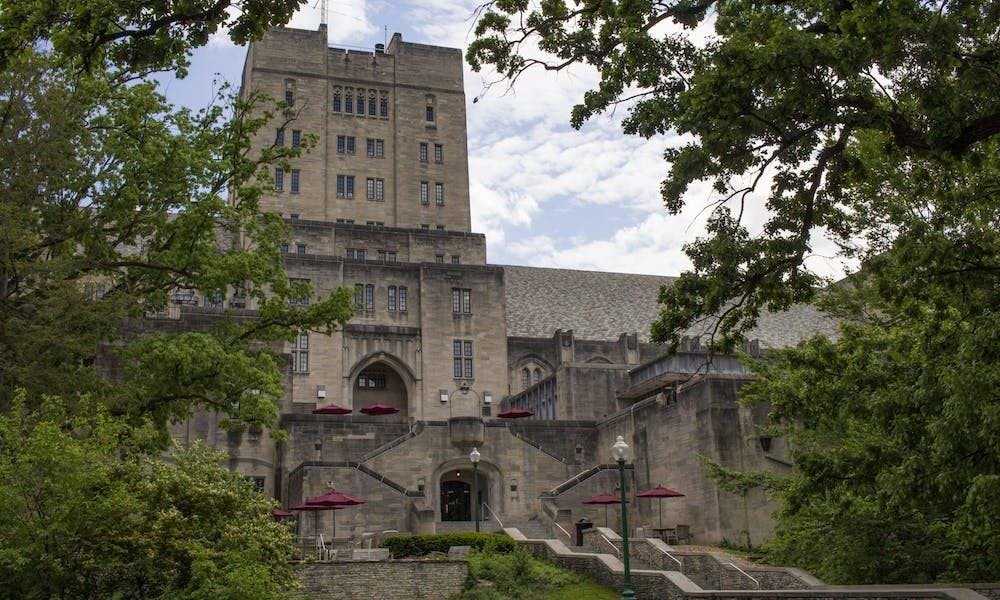About 30 people sat in a circle Monday at the Frangipani Room in the Indiana Memorial Union. They passed a microphone around, solemnly reading names, ages ranging from as young as two years old and as old as 79 and hometowns off a list projected onto the screen at the front of the room. These names belong to people missing or killed during the ongoing Israel-Hamas war. While many news outlets have reported on the daunting number of casualties and hostages, the IU Robert and Sandra Borns Jewish Studies Program vigil recognized each number represents a human life.
The vigil was held to grieve victims of the events in Israel and Gaza over the past few weeks. Militant organization Hamas launched one of the largest attacks on Israeli territory Oct. 7, which was followed by a declaration of war from Israel and large-scale retaliatory air strikes on Gaza. Since then, at least 1,400 people have been killed in Israel while 3,400 have been injured. In Gaza, at least 2,778 people have been killed while 9,938 have been injured as of Tuesday morning. Tuesday afternoon, the Associated Press reported more than 500 people were killed in an airstrike on a hospital in Gaza.
At the beginning of the vigil, attendees — roughly half students and half faculty from a variety of academic departments — read the names, ages and cities of victims. Ages ranged from as young as two years old to as old as 79.
After reading from the list, Irit Dekel, assistant professor of Jewish Studies and Germanic Studies, invited people to say the names of people they personally know and were worried about. People spoke of best friends, grandchildren, cousins and people they met years ago but have lost contact with.
Eliza Frankel, a Ph.D. student in sociocultural anthropology with a minor in Jewish Studies, spoke during the vigil and said she didn’t know if her friend is safe. She said she knew her friend would have appreciated the vigil’s effort to embrace unity during a difficult time.
“What I'm trying to say is I think he was a peace man and tried to find a lot of bridges between Israel and Palestine,” Frankel said.
Frankel said peaceful events that unite people are important during divisive times.
“People are devastated and dying right now, and I want you to know that we have been speaking about solidarity and love, they're not slogans, but a necessity right now,” Frankel said. “A necessity.”
Some attendees expressed frustration that their children and grandchildren were still living in fear from a conflict that began generations ago.
“For me it’s a multigenerational thing,” one attendee said. “I remember being a child during wars in Israel, having my parents and teachers trying to explain things to me. Being a parent to young children during wars and having to go through that and now seeing my daughter do the same thing.”
Other attendees discussed fear for family members called upon to join the military and partake in the conflict. According to the Associated Press, 360,000 military reserves from Israel and massed troops and tanks were called up to service since Oct. 7.
“All the young men in my family and many of my friend's sons are all called up to duty,” an attendee said.
Noa Balf, Olamot postdoctoral fellow, said Israel mandates military service and her brother was on reserve when Israel declared war. He was called upon to go to base Oct. 14. Once her brother arrived at the base, he was informed that he was going to be sent south, somewhere near Gaza.
Toward the end of the meeting, Joanna Niżyńska, an associate professor of Slavic and East European Languages and Cultures, turned to address Frankel and Dekel.
“I’m worried about your family,” Niżyńska said. “About families of mine, Jewish and Palestinian friends from various countries. I’m worried that this might divide campus and our faculty members and students, and thank you for finding space in your pain for helping us to work through it.”
She said she was grateful for those that attended the vigil.
“To share feelings and to share this uncertainty that is very painful and triggers all types of anxieties about all types of wars in all types of places,” Niżyńska said. “I am very grateful for everybody who decided to bring us together and find a space where there are no division, just sorrow.”
Dekel, Frankel and Balf are among the main organizers of the vigil. A group of students expressed interest in mourning the loss of lives from a non-national, non-religious perspective so Dekel collaborated with Frankel, Balf and the Jewish Studies program to organize the vigil.
The Indiana Daily Student reported Oct. 9 students in support of Israel and students in support of Palestine held separate peaceful gatherings that ended in clashes between the two groups. A week later, at Monday’s vigil, two IU Police Department officers were stationed at the door of the meeting room.
Balf said that she hopes that people will engage and recognize how important it is to focus on the people impacted and deprioritize taking a definitize side.
“People should focus on nuance and on the impacted people and center that, and perhaps less on virtual signaling” Balf said.
The idea of reading names as a way to honor those impacted by the war comes from a Jewish tradition in which people say the names of loved ones they are worried about during public prayer so the community can keep them in their thoughts, Dekel said.
Dekel said she and a team of others compiled the list of names read at the vigil by looking through daily Israeli and Palestinian public media. She said some of the newspapers were in Arabic and Hebrew, so she had to translate some names to compile the list.
However, Dekel said it is important to note the list is not complete.
“Unfortunately, it is not a final list as the conflict is not over,” she said.
At the end of the vigil, attendees read two poems.
The first poem, Taha Muhammad Ali’s “Revenge”, was read in Arabic and English. The second poem, Some People by Wislawa Szymborska, was read in Hebrew and English.
As the attendees bowed their heads and listened to the poem, seemingly endless pages filled with the names of the killed and missing scrolled down the screen.
“But if it came to light / when my rival appeared / that he had a mother / waiting for him / or a father who’d put / his right hand over / the heart’s place in his chest / whenever his son was late / even by just a quarter-hour / for a meeting they’d set — / then I would not kill him, / even if I could,” Ali’s poem read.




